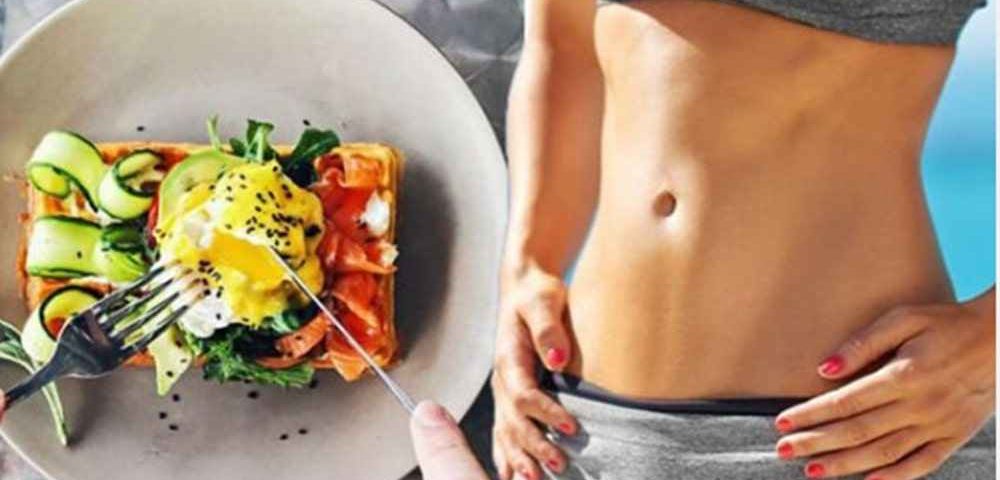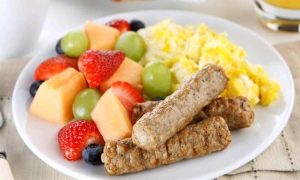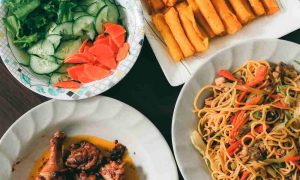- Have any questions?
- +880-1832219025
- englishrajib877@gmail.com
The Best Diet to Lose Belly Fat: A Comprehensive Guide

10 Best High Protein Low Fat Foods
October 5, 2023
Healthy Breakfast to Lose Weight
October 10, 2023The Best Diet to Lose Belly Fat: A Comprehensive Guide

The Best Diet to Lose Belly Fat
In a world obsessed with fitness and appearance, shedding excess belly fat has become a common goal for many individuals.
However, finding the best diet to achieve this can be perplexing given the abundance of information available. In this article, we’ll explore the most effective dietary strategies to help you lose belly fat and achieve a healthier, slimmer physique.
Understanding Belly Fat
Types of Belly Fat
Belly fat can be categorized into two main types: subcutaneous fat and visceral fat.
Subcutaneous Fat
Subcutaneous fat is the fat that lies just beneath the skin’s surface. It’s the pinchable, jiggly fat that you can grasp with your fingers.
Visceral Fat
Visceral fat, on the other hand, is located deep within the abdominal cavity, surrounding vital organs such as the liver and intestines. This type of fat poses greater health risks.
Why Belly Fat Matters
Understanding why belly fat matters is essential. It’s not just about aesthetics; excessive abdominal fat is linked to various health problems, including heart disease, diabetes, and metabolic disorders.
The Best Diet to Lose Belly Fat
A Balanced Diet
A balanced diet forms the foundation of any successful weight loss journey. Focus on consuming a variety of nutrient-dense foods.
Portion Control
Controlling portion sizes is crucial. Be mindful of your calorie intake and avoid overeating.
Macronutrients
Pay attention to macronutrients, which include carbohydrates, protein, and fat. Strive for a balanced ratio that suits your body’s needs.
Foods to Include
Certain foods can help target belly fat effectively.
High-Fiber Foods
Fiber-rich foods like fruits, vegetables, and whole grains can aid in weight loss by promoting a feeling of fullness.
Lean Protein
Protein-rich sources such as lean meats, fish, and legumes can boost metabolism and help maintain muscle mass during weight loss.
Healthy Fats
Incorporate sources of healthy fats like avocados, nuts, and olive oil into your diet.
Foods to Avoid
Avoiding certain foods is equally important.
Sugary Beverages
Cut down on sugary drinks like soda and fruit juices, as they can contribute to abdominal fat.
Processed Foods
Minimize your consumption of highly processed foods, which are often high in unhealthy fats and added sugars.
Meal Timing
Intermittent Fasting
Intermittent fasting is an eating pattern that can aid in belly fat reduction by restricting eating to specific time frames.
Hydration
Staying well-hydrated is essential for overall health and can help control cravings.
Exercise and Belly Fat
The Importance of Physical Activity
In addition to maintaining a healthy diet, regular exercise is essential for losing belly fat. Exercise helps burn calories and can further boost your metabolism.
Cardiovascular Exercises
Cardiovascular exercises like jogging, cycling, and swimming are effective for burning calories and reducing overall body fat, including belly fat.
Strength Training
Strength training, such as weightlifting or bodyweight exercises, helps build muscle. Muscle burns more calories at rest, which can aid in long-term fat loss.
Lifestyle Factors
Sleep
Getting enough quality sleep is crucial for weight management. Lack of sleep can disrupt hormones that regulate hunger and appetite, potentially leading to weight gain, including belly fat.
Stress Management
As mentioned earlier, chronic stress can contribute to the accumulation of visceral fat. Practicing stress management techniques like meditation, deep breathing, or spending time in nature can be beneficial.
Alcohol Consumption
Limiting alcohol consumption is advisable when trying to lose belly fat. Alcoholic beverages are often high in calories and can lead to overeating.
Sustainable Weight Loss
Setting Realistic Goals
It’s important to set achievable, realistic goals for belly fat loss. Rapid weight loss is often unsustainable and can lead to muscle loss.
Monitoring Progress
Tracking your progress can be motivating. Consider keeping a food diary and monitoring your exercise routines to stay on track.
Best diet to lose belly fat female
In today’s world, many women are on a quest to achieve a slim and toned midsection. Belly fat, especially in women, can be stubborn and challenging to shed. But fear not, as we’ve compiled a comprehensive guide on the best diet to lose belly fat specifically tailored for females.
Understanding Belly Fat
Before diving into the best diet plans, it’s essential to understand the types of belly fat and why it accumulates. There are two main types of belly fat: subcutaneous and visceral.
Subcutaneous fat lies just beneath the skin, while visceral fat surrounds internal organs. While both types are undesirable, visceral fat is more dangerous as it is linked to various health issues like heart disease and diabetes.
Why Belly Fat Accumulates in Women
Several factors contribute to the accumulation of belly fat in women:
Hormonal Changes
Menopause: Hormonal changes during menopause can lead to an increase in belly fat.
Stress: Elevated cortisol levels due to stress can promote fat storage in the abdominal area.
Poor Diet
High Sugar Intake: Excessive sugar consumption can result in fat accumulation around the abdomen.
Processed Foods: A diet rich in processed foods can lead to weight gain in the belly region.
The Best Diet Strategies
Now, let’s explore the most effective diet strategies to lose belly fat:
Balanced Diet
Incorporate Lean Protein: Include sources like lean meat, fish, and tofu to boost metabolism.
High-Fiber Foods: Fiber-rich foods like vegetables, fruits, and whole grains keep you feeling full.
Healthy Fats
Monounsaturated Fats: Foods like avocados, nuts, and olive oil can aid in reducing belly fat.
Omega-3 Fatty Acids: Fatty fish like salmon and flaxseeds are excellent sources.
Portion Control
Mindful Eating: Pay attention to portion sizes and avoid overeating.
Frequent Meals: Opt for smaller, frequent meals to maintain stable blood sugar levels.
Stay Hydrated
Drink Water: Adequate water intake helps in digestion and prevents bloating.
Limit Sugar and Processed Foods
Cut Sugary Beverages: Eliminate or reduce sugary drinks from your diet.
Avoid Processed Snacks: Opt for whole, unprocessed foods instead.
Exercise and Belly Fat
While diet plays a crucial role, incorporating exercise is equally important. Here are some exercises to complement your diet:
Cardiovascular Exercise
Aerobic Workouts: Engage in activities like running, swimming, or cycling.
High-Intensity Interval Training (HIIT): Effective for burning calories and reducing belly fat.
Strength Training
Core Workouts: Target your abdominal muscles with exercises like planks and leg raises.
Full-Body Resistance Training: Builds muscle, which can help burn fat even at rest.
Maintaining Motivation
Losing belly fat takes time and dedication. To stay motivated:
Set Realistic Goals
Short-Term and Long-Term Goals: Break your journey into achievable milestones.
Track Progress: Keep a journal to monitor your diet and exercise routines.
Seek Support
Join a Fitness Community: Share experiences and tips with like-minded individuals.
Consider a Personal Trainer: Professional guidance can be invaluable.
Best diet to lose belly fat male
Understanding Belly Fat
Before delving into the best diet practices, it’s essential to understand the nature of belly fat.
Belly fat, also known as visceral fat, accumulates around the abdominal organs and can lead to various health issues, including heart disease and diabetes. Therefore, targeting this fat is crucial for overall well-being.
Why Targeting Belly Fat Matters
Belly fat is not just a cosmetic concern; it is a health concern as well. Understanding why it matters is the first step toward taking action.
The Best Diet for Men to Lose Belly Fat
Now, let’s get into the nitty-gritty of the best diet practices for men to shed that stubborn belly fat.
Balanced Diet
A balanced diet is the foundation of any successful weight loss journey. It includes a variety of food groups in the right proportions.
High-Protein Foods
Protein is your ally in losing belly fat. It boosts metabolism, reduces appetite, and aids in muscle preservation.
Fiber-Rich Foods
Fiber keeps you feeling full for longer and helps control your appetite. Incorporate plenty of fruits, vegetables, and whole grains into your diet.
Healthy Fats
Not all fats are bad. Opt for sources of healthy fats like avocados, nuts, and olive oil to support your weight loss efforts.
Avoid Sugar and Processed Foods
Excessive sugar intake and processed foods can lead to fat accumulation around the waist. Cutting these out is essential.
Portion Control
Controlling portion sizes can prevent overeating and aid in weight loss.
Regular Meals
Skipping meals can slow down your metabolism. Stick to regular meal times.
Hydration
Staying hydrated is crucial for overall health and can help control cravings.
Green Tea
Green tea contains antioxidants that can boost metabolism and aid in fat loss.
Adequate Sleep
Lack of sleep can lead to weight gain, so ensure you get enough rest.
Stress Management
Chronic stress can contribute to belly fat. Practice stress-reduction techniques like meditation or yoga.
Strength Training
Incorporate strength training exercises to build muscle and increase metabolism.
Cardiovascular Exercise
Cardio workouts, such as jogging or cycling, are effective for burning calories and shedding belly fat.
Consistency is Key
Consistency in your diet and exercise routine is essential for long-term success.
Seek Professional Guidance
If you’re struggling to lose belly fat, consider consulting a nutritionist or personal trainer for personalized guidance.
The best diet to lose belly fat and gain muscle
The Importance of Diet
Before we delve into the specifics of the best diet for achieving your fitness goals, it’s crucial to understand that diet plays a fundamental role in your overall well-being.
It’s often said that “abs are made in the kitchen,” and there’s a lot of truth to that statement. Regardless of how hard you work out, if your diet is not on point, your progress will be limited.
Belly Fat vs. Muscle Gain
To effectively address both belly fat and muscle gain, you need to strike a balance. It’s common for people to focus solely on fat loss or muscle gain, but the key is to find a diet that supports both goals simultaneously. This requires a comprehensive approach that considers various factors.
Crafting Your Diet Plan
Macronutrient Balance
To optimize fat loss and muscle gain, your diet should prioritize the right balance of macronutrients. This means incorporating an adequate amount of protein, healthy fats, and complex carbohydrates into your meals.
Proteins are essential for muscle repair and growth, while fats provide energy and support overall health. Complex carbs supply the energy needed for your workouts.
Protein – The Muscle Builder
Proteins are the building blocks of muscle tissue. Aim to include lean sources of protein like chicken, turkey, fish, tofu, and legumes in your diet. Protein also helps you feel full, reducing your overall calorie intake.
Healthy Fats – Fuel for Progress
Incorporate sources of healthy fats such as avocados, nuts, and olive oil into your meals. These fats support muscle growth, aid in nutrient absorption, and help you stay satisfied.
Complex Carbohydrates – Energy Boosters
Choose complex carbohydrates like quinoa, brown rice, and sweet potatoes to fuel your workouts and provide sustained energy throughout the day.
The Importance of Meal Timing
Meal Frequency
To maintain steady energy levels and support muscle gain, consider eating smaller, balanced meals throughout the day. This approach can help prevent overeating and support your metabolism.
Pre- and Post-Workout Nutrition
Your pre-workout meal should include a combination of carbohydrates and protein to provide energy for your exercise routine. After your workout, refuel with a protein-rich meal to support muscle recovery and growth.
Lifestyle Factors
Hydration
Staying adequately hydrated is crucial for overall health and can help control your appetite. Aim to drink plenty of water throughout the day.
Sleep and Stress Management
Don’t overlook the importance of quality sleep and stress management in your fitness journey. Lack of sleep and chronic stress can hinder your progress, so prioritize both for optimal results.
The best food to lose belly fat
The Two Types of Belly Fat
Before delving into the diet plan, let’s understand the two types of belly fat: subcutaneous and visceral.
Subcutaneous Fat
Subcutaneous fat lies just beneath the skin and is the softer, pinchable fat. While it can be bothersome, it’s not as harmful to health as visceral fat.
Visceral Fat
Visceral fat surrounds your internal organs and poses a more significant health risk. Reducing this fat should be a primary goal for a healthier lifestyle.
The Diet Plan
Balancing Macronutrients
A well-rounded diet is essential for belly fat reduction. Focus on:
Protein
Incorporate lean sources of protein like chicken, fish, and tofu to support muscle growth and boost metabolism.
Healthy Fats
Opt for monounsaturated fats found in avocados, nuts, and olive oil. These fats can help reduce visceral fat.
Complex Carbohydrates
Choose complex carbs like whole grains, fruits, and vegetables for sustained energy and better blood sugar control.
Portion Control
Smaller, Frequent Meals
Eating smaller, more frequent meals can prevent overeating and keep your metabolism active throughout the day.
Mindful Eating
Practice mindfulness while eating, savoring each bite, and avoiding distractions. This helps in better portion control.
Hydration
Water
Drink plenty of water throughout the day to stay hydrated and support your metabolism.
Herbal Teas
Herbal teas like green tea can boost metabolism and aid in belly fat reduction.
Foods to Include
High-Fiber Foods
Fiber-rich foods like oats, beans, and vegetables keep you feeling full and aid in digestion.
Probiotics
Probiotic-rich foods like yogurt promote a healthy gut, which can contribute to weight loss.
Foods to Avoid
Sugary Beverages
Cut out sugary drinks like sodas and fruit juices, as they can lead to weight gain, especially around the belly.
Processed Foods
Reduce your intake of processed foods, which are often high in unhealthy fats and sugars.
Exercise
While diet plays a significant role, incorporating regular exercise is crucial for belly fat reduction. Consider a mix of cardio and strength training exercises.
Conclusion
In your quest to lose belly fat and achieve a healthier lifestyle, remember that consistency and patience are key. There is no one-size-fits-all approach to dieting, so it’s essential to find a plan that suits your preferences and lifestyle.
10 foods that are toxic for dogs and should be avoided at all costs
Get started on your journey to a slimmer waistline today! It’s not just about looking good; it’s about feeling healthier and more confident in your own skin.
FAQs about The Best Diet to Lose Belly Fat
How quickly can I expect to see results when following a belly fat loss diet?
The rate at which you see results can vary from person to person. It depends on factors such as your starting point, dedication, and adherence to the chosen diet plan. Generally, noticeable changes may take several weeks.
Is spot reduction of belly fat possible through diet alone?
Spot reduction is a common misconception. You cannot target fat loss in one specific area of your body through diet alone. Fat loss occurs throughout your body as you create a calorie deficit.
Are there any specific exercises that can help complement a belly fat loss diet?
While diet plays a significant role in losing belly fat, incorporating regular exercise can enhance your results. Cardiovascular exercises and strength training can help burn calories and build lean muscle.
Can stress contribute to belly fat?
Yes, chronic stress can lead to the accumulation of visceral fat. Stress management techniques, such as meditation and yoga, can be beneficial when combined with a healthy diet.
Can genetics influence belly fat?
Genetics can play a role in where your body stores fat. However, a balanced diet and an active lifestyle can still help you achieve a healthier body composition.
You can also read:
Mushroom chocolate a delightful blend of flavors





